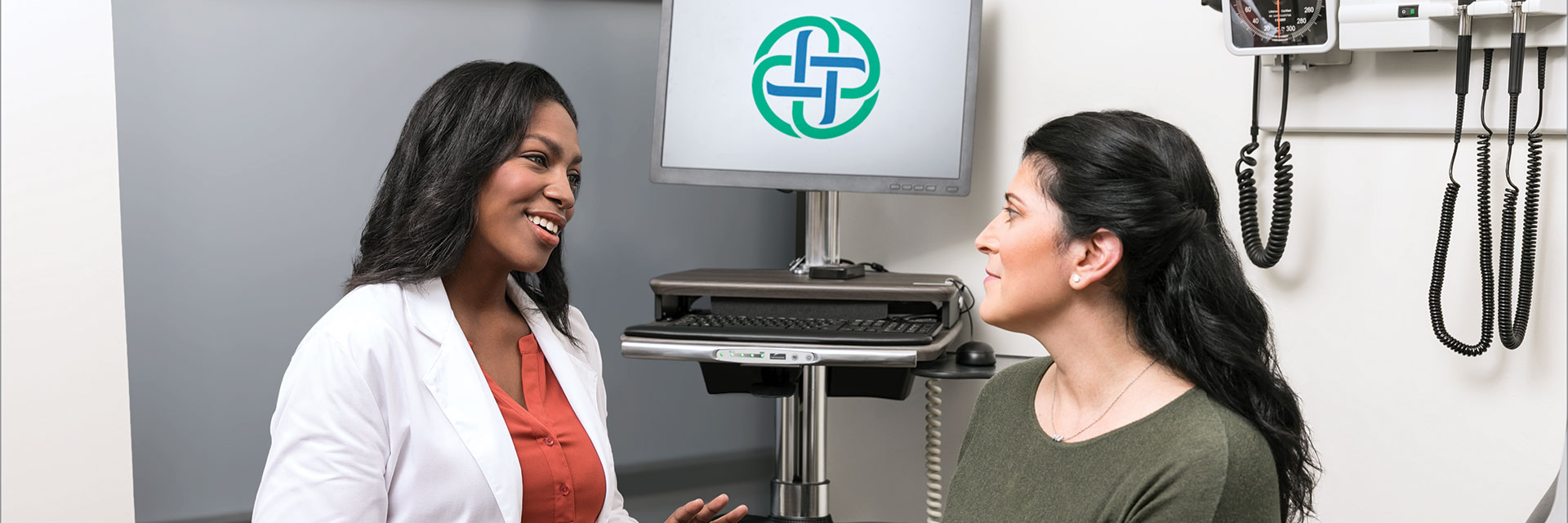Living Healthy at Any Age
Throughout each phase of a woman's life, her body and health needs evolve, calling for personalized care at each step.




-
Don't Ignore These Symptoms
The anatomy of a woman’s pelvic organs can change as they age. If you are experiencing any of the following, the American College of OB/GYN’s suggested you may want to call your OB/GYN or midwife:
- Significant pelvic pain or cramps before or during your period
- Bleeding between periods or postmenopausal bleeding
- Heavy or missed periods
- Unusual discharge or soreness in the genital area
- Involuntary release of urine when you cough, sneeze or laugh
- Frequent and sudden uncontrollable need to urinate
- Pain during or after sex
Things That May Cause Reproductive Issues
Living well for a woman has a lot to do with her reproductive health. When everything is in order, your reproductive system goes rather unnoticed. But there are some things that can upset your system that may require assistance from or consultation with a healthcare provider. These include:
- Hormone changes
- Antibiotics
- Intercourse
- Douches
If you’re ready to start your family but you haven’t conceived after a year of trying, it’s time to talk to your doctor regarding fertility.
-
Pelvic Floor and Incontinence
Urinary Incontinence
If you find yourself racing to the bathroom or leaking each time you cough, laugh or sneeze, you’re not alone. Urinary incontinence is when the muscles that form a sling across the pelvic floor begin to lose their tone. The same weakening of pelvic floor muscles that leads to incontinence can also cause sagging of pelvic organs, including the vagina, uterus, bladder and rectum. The American College of OB/GYN says you may want to speak with your OB/GYN if you are experiencing:
- Leaking urine
- Frequent urination
- Fecal incontinence
- Painful urination
Pelvic Floor Disorders
Pelvic floor disorders, such as urinary incontinence and pelvic support problems, don't have to be treated as a normal part of the aging process. Examples of pelvic floor disorders include:
- Pelvic organ prolapse
- Bowel incontinence
- Defecation or voiding dysfunction
-
Pelvic Pain
The anatomy of a woman’s pelvic organs can change as she ages, which creates a feeling of pelvic pressure or heaviness. These symptoms sometimes indicate pelvic support problems, or prolapse, and can require pelvic reconstruction. There are many conservative treatment options for pelvic support problems, including changes in diet, weight loss and special kinds of exercises. If these changes are insufficient, your doctor might recommend pelvic reconstruction surgery.
-
Heavy and Irregular Periods
Heavy Periods
According to the American College of OB/GYN, on average, menstrual bleeding lasts about four to five days and the amount of blood lost is small — between two and three tablespoons. You may want to discuss heavy periods with your doctor if you:
- Have a menstrual flow that soaks through one or more pads or tampons every hour for several hours in a row
- Need to double up on protection to control your menstrual flow
- Need to change pads or tampons during the night
- Have menstrual periods lasting more than seven days
- Have a heavy menstrual flow that keeps you from doing the things you would do normally
- Have constant pain in the lower part of the stomach during your periods
- Are tired, lack energy or are short of breath
Irregular Periods
Typically, on average, a woman gets her period every 24 to 38 days, but there are many things that can cause irregular periods. You may have what’s considered irregular periods if:
- The time between each period starts to change
- You lose more or less blood during a period than usual
- The number of days that your period lasts varies significantly
You probably don’t need treatment for irregular periods unless they disrupt your ability to function, or if you need treatment for another condition that’s affecting your menstrual cycle. Contact your provider if you are concerned about pattern changes in your regular, monthly period. You know your body better than anyone.
-
Common Vaginal Infections
They’re itchy and uncomfortable, and no one really likes to talk about them. Vaginal infections are very common in women, but it’s important to know which infection you have in order to move forward with the best course of care.
There are three main types of vaginal infections:
- Yeast Infections – Candida fungus is a bacteria that lives in your body and thrives in a warm, moist, airless environment. Symptoms may include vaginal itching and redness accompanied by a thick, white discharge.
- Bacterial Vaginosis – A bacteria called lactobacilli lives in the vagina, and when the level of lactobacilli changes and gets too low, it can be replaced by infection-causing bacteria. This infection typically creates a thick or whitish discharge or one that is slippery and clear. A fishy odor may also be noticeable.
- Trichomonas (Trich) – Trich is a sexually transmitted infection with symptoms that include burning, irritation, redness and localized swelling with vaginal discharge.








